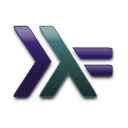Haskell

Haskell is a functional programming language. If you have some programming experience, see the overview to see a bit of how Haskell works and is different from other languages.
Haskell is distinct in a few ways:
- Haskell is a pure functional programming language. If you call the same function twice in two different places with the same arguments, it will return exactly the same value both times.
- Haskell provides a modern type system with sophisticated features like typeclasses and generalized algebraic data types (soon enough, terms like those will roll smoothly off your tongue).
- Haskell is also a lazy language that does calculations only when they are needed to get a final result.
Haskell programmers enjoy their language because dealing with only pure functions makes code much easier to understand and each function's correctness much easier to analyze and even to prove. Moreover, the advanced type system helps catch mistakes, both silly and profound.
In this book we aim to introduce you both to the Haskell language, from the very basics to advanced features, and to computer programming in general. We urge seasoned programmers to be especially patient with this process. In all likelihood, the languages you are most familiar with differ greatly from Haskell, and habits from those languages might make it more difficult to understand how things work − they are simple, but different. Face learning to see the world through the warped mindset of a functional programmer as an adventure in a brave new world, which will bring you understanding valuable far beyond the boundaries of any language.
Overview
The book is divided into a Beginner's Track, an Advanced Track, and a section called Haskell in Practice which covers more day-to-day issues and uses mostly only items from the Beginner's Track.
Search
The following box can be used to search for content in the book:
Beginner's Track
With the basics of the language and some of the more frequently used libraries, you will be able to build simple programs.
Most chapters contain exercises that help you test your understanding. At the end of each chapter is a link to the solutions, so you can check your accuracy or learn the answers if you are stuck.
Advanced Track
This section introduces wider functional programming concepts such as different data structures and type theory. It will also cover more practical topics like concurrency.
Advanced Haskell
|
Fun with Types
|
Wider Theory
|
Haskell Performance
|
Haskell in Practice
Day-to-day issues of working with Haskell include items such as knowing the standard libraries, building graphical interfaces, and working with databases. You should be able to jump directly to this section from the beginner's track.
Libraries Reference |
General Practices
|
Specialised Tasks
|
Appendices
- Syntactic sugar
- Answers to exercises
- Authors and Acknowledgements
About the book
- Notes for contributors
- Style conventions
- To do
- Templates for the Haskell wikibook
- Experimental Modules
- List of topics
Other Haskell tutorials
- Haskell Meta-tutorial - the tutorial to find other tutorials
- Learn You a Haskell for Great Good - Tutorial aimed at beginners who may have experience in imperative programming languages but haven't programmed in a functional language before. Available online at no charge (CC-BY-NC-SA license); also released as a conventional book.
- Real World Haskell - an O'Reilly book, available online at no charge (CC-BY-NC license). Built around case studies of practical applications.
Tutorials that have been incorporated into the Haskell Wikibook
The following may be read independently, but their content has been imported and adapted already into the Wikibook here
- Write Yourself a Scheme in 48 Hours - An alternate approach to teaching Haskell (and perhaps Scheme), aimed at a more advanced audience (though not necessarily one that knows how to program!)
- Yet Another Haskell Tutorial - aimed at beginners and takes a practical approach to things.
Additional resources
- Learning Haskell at haskell.org
- What I Wish I Knew When Learning Haskell — A wide-ranging collection of concise summaries of many intermediate and advanced Haskell topics. Released in the public domain.